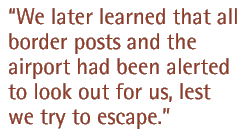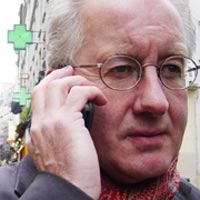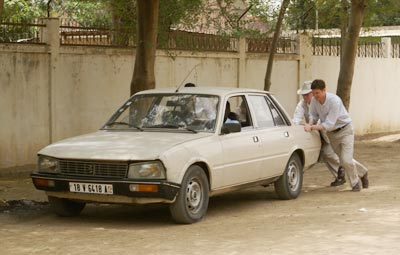It was a frightening phone call. I was in my room in the Novotel in N'Djamena, the capital of Chad. Military Intelligence had taken my passport two weeks earlier. All our equipment -- two HD cameras, sound supplies and any gadget we had -- had been confiscated by armed guards a few days before that. Now, Chad's ambassador to the U.S. and Canada, Mahmoud Bechir, had some chilling news. He was in N'Djamena for an African summit. He had just met with the Ministry of Defense people and his report was: "They are talking espionage, Neil."
This was my first attempt to make a film on Darfur. Just one mistake had put us on the wrong side of a personal drama -- the sort of story we like to cover, not live through.


Producer Neil Docherty
April 11, 2007 was my first night in N'Djamena. The plan was to take a U.N. flight east the next morning to get to the refugee camps on the border with Sudan. A lot of our equipment and supplies had already left by road. I was being helped by Omer Ismail, a Sudanese refugee living in Virginia, and Colin Thomas Jensen, a Sudan expert from the International Crisis Group. Both Omer and Colin had been to Chad numerous times and had facilitated several media trips to the border and across into Sudan.
The bar in the Novotel seemed to be the place where characters gathered to see if they could land a part in a Graham Greene novel. Most were in costume: the military garb of the Chadian army; the long white robes and headdress preferred by the sundry Sudanese rebel figures, who had taken sanctuary in Chad; the "designer" cut of the rather silly shorts sported by the French soldiers (it wouldn't have taken much to turn them into thongs); the T-shirts of the oil workers from Europe and the States that couldn't fully accommodate their ample girths; the toned down fashions and sensible shoes of the NGO workers.
Out of that throng appeared Kamal, a leader of one of the rebel groups, with the build of an NFL lineman. He was a contact of Omer's and he assured us he could get us an interview with a former Janjaweed. "Janjaweed" is the pejorative name given to the Arab tribes in Darfur that the Sudanese regime has used to do much of the ethnic cleansing. Kamal said one of their number was recovering from a car accident in a local hospital. He had arranged for us to interview him. We could leave now -- 7:00 p.m.
Cabs in Chad are really "rent-a-wrecks." A couple of them answered the call of the bellman with the groans of middle age and we set off on our misadventure. Within five minutes Kamal was talking with a couple of guards at the hospital gate. By now it was dark. It took Kamal a couple of minutes of chat and we were in. We parked in a courtyard, carried our gear along a corridor and into a private room. These facts would later all feature prominently in diplomatic notes and discussions.
In the room sat Salah Mohammed Abdelrahman, aka Abu Lsurra. He had an injured arm, seemingly held together with pins. He was friendly and welcoming. During the interview it became clear that, though he was an Arab from Sudan, he was not an active Janaweed in the current crisis; he was more of a politico who opposed the current Sudanese government. After about 10 minutes, as I was trying to end the interview gracefully, an administrator dressed in a white coat stopped the proceedings. In the ensuing discussion between Omer and the administrator it became apparent that we should pack up and leave.
As we left the building we were greeted by about half a dozen armed guards who demanded that we leave our equipment in a pile. It was then I learned that we were in a military hospital, and clearly someone had taken considerable umbrage. My immediate concern was the $40,000 on my person in various vest pockets, inside my hat and in a money belt. As our fanny packs, pouches and bags were being piled up, I was searching for the appropriate pose of calm authority that might distract attention from a number of unseemly bulges in my clothing. Omer tells me our predicament is beyond a bribe.
I have a favorite phrase I use to mock the many factotums, bureaucrats and spin meisters who conspire the world over to thwart our efforts. They are known to me as the "Program Prevention Department." I have long joked that they have training camps in far-flung corners, and this time I thought I had flushed out their operation in Chad.
Sadly, I was to learn that the Chadian franchise had taken obstructive behavior to a whole new level.
That night our taxis were impounded. We were bundled into a van and, under armed guard, taken to our hotel.
The next day Military Intelligence arrived and confiscated our passports. We later learned that all border posts and the airport had been alerted to look out for us, lest we try to escape.
A couple of days later Military Intelligence arrived -- three of them -- to interrogate each of us. This was all done quite civilly, and by then we had both the U.S. and Canadian diplomats involved.
Then we sat and waited. Omer, Colin and myself, plus cameraman Mark Phillips and sound man Joe Passaretti. Omer was working his contacts in the regime. He had good contacts, but there was a problem: Minister of Defense Mahamat Nour had been, six months earlier, a Chadian rebel opposed to the regime of President Idriss Déby. Nour had lead a coup attempt, a rather pathetic one by all accounts, in which his boy soldiers entered the capital and had to ask directions to the palace. Even then, it is said they got confused and initially laid siege to a library until they got their bearings. Nonetheless, in the confusing politics of Chad, Nour was now the minister of defense, and it was his department who were aggrieved. Omer's contacts, it turned out, didn't want to deal with the new minister of defense.
Diplomats at the U.S. embassy, in particular Art Bell, the public affairs officer, and Lyn Whitehouse, the Canadian consul, were extremely helpful, but as the drama unfolded, it became clear there were severe limits on what they could achieve.
The incident happened on April 11th. This is a note I made on April 24th:
General confusion remains. Bell did get to meet with Mr. Boniface (deputy min[ister] of defense) and was greeted with a great deal of obfuscation. The conversation was like this:
He asked who has to sign off on this?
"The responsible authorities."
And who exactly is that?
"It is making the rounds."
And on and on. The latest is that a decision will be made by late tomorrow.
The embassy is running out of ideas, other than to continue to press as they are doing, and eventually it will be sorted out.
The next day came and went like so many others. At the meeting with the diplomats that day Art Bell came away with a memorable phrase: "There is really not much we can do until you are arrested."
Kamal, Omer's local contact, had been arrested and was spending his second week in detention. The taxis were still impounded and I was paying the owner a daily rate. This prompted me to suggest we contact Ambassador Bechir. He was based in Washington; he was the son-in-law of the president; he knew Omer; and he knew the ways of the Western media.
Jean Pierre Lavoie, the Canadian ambassador to Chad, is based in neighboring Cameroon. He too was extremely attentive to our predicament. He contacted Ambassador Bechir, who happened to be in town and came to see me at the Novotel before going off to the summit meeting.
His report back that "espionage" was being bandied about was alarming to everyone involved. It then took a couple of days for the problem to be become clear. The worry, according to Bechir, was "the Sudanese guy," Omer. Chad and Sudan have a strained relationship. They each support the other country's rebels, and their armies and various proxy militias are often skirmishing on the border. The claim was that the hospital we had entered was treating some Sudanese soldiers who were casualties of the latest skirmish. The suspicion was apparently that Omer had deliberately taken us into the hospital to somehow embarrass the regime.
The truth is Omer Ismail has long been a dissident of the brutal Sudanese regime and has courageously and relentlessly campaigned against them.

Producer Neil Docherty (left) and Colin Thomas Jensen of International Crisis Group pushing one of their cabs to get it started, early in the morning on the fateful day that they filmed at the hospital (photo courtesy of Joe Passaretti).
The scenario constructed by Military Intelligence was patently ludicrous but came embroidered with nefarious details. The most amusing of which was the claim that we had used special cars with darkened windows so we could film in furtive fashion as we entered the "military installation." They were, of course, the groaning cabs from the hotel, one of which we had used earlier in the day and had had to push to kick-start the engine (see picture). Also, as I would point out in briefing notes to our diplomats, the authorities had our cameras and tape, and were thus in a commanding position to check if there had been any "secret" filming.
It is impossible to know what really was going on inside the regime, but I am prone to the simple explanation that we mistakenly entered a military hospital and the military didn't like it. The minister was out of town for much of the episode and his staff couldn't make a decision. It is possible that the focus on Omer was the military's face-saving operation. A more sinister scenario is that they would use the high-profile dissident as a pawn to curry some favor or concession from the Sudanese.
There were a couple of days where Omer thought he would have to "accept his fate," as he put it. He was impressive in his demeanor throughout, bravely girding, preparing to pay a price for his opposition to the genocide that has been perpetrated on his people. The rest of us took the firm view that Omer's fate was to be on the plane with us. Mark and Joe took only seconds to vote that we would not leave without Omer. And Colin was staying. It was unanimous.
Some of us had originally been booked to fly out on the midnight flight on April 27th. Mark, Joe and I went into town and booked Colin and Omer on the same flight to try and give the diplomats a deadline to work with.
In the next 24 hours, as diplomatic pressure mounted and we bombarded the Chadian authorities with clippings describing Omer as an ardent opponent of the regime in Khartoum, our fate seemed to blow hither and thither with each phone call and missive.
These are some of my notes back to my bosses:
26th April
5:30 pm
… Our strong inclination is to stay in solidarity with Omer as long as that is practical/possible. We are trying to push for his "exoneration" in our diplomatic efforts. Lavoie (Canadian ambassador) and the U.S. believe it is possible we will be offered our passports back if we agree to leave without Omer. Though I must stress this has not been offered yet.
6:10pm
I just spoke with Ambassador Bechir and told him we do not want to be split from Omer. We came and will leave together. He told me he has no intention of splitting Omer from the rest of us and is still working to resolve the issue. He confirms that mil[itary] intell[igence[ are focusing on Omer, but they don't know him. He has postponed his travels to work on this.
6:30 pm
Lyn Whitehouse (Canadian consular) has just got off the phone with the Min[ister] of Defense Mohamamt Noor, who has assured us we can ALL leave tomorrow
… She insists that he said ALL of us.
We wait and Lyn advises prayer
April 27th
9:15 am
J.P. Lavioe called-- says the Min[ister] of Defense has agreed to release passports except Omer's is still a problem. He told J.P. two have already been released and we should have them all and the gear by noon.
Also the U.S. is putting on pressure on behalf of Omer and there are several high level meetings taking place as we speak including ones at the Min[istry] of Defense, External Affairs, and the Presidency.
I told J.P. that we have decided not to leave unless Omer is with us. He officially is recommending that we do leave on that flight tonight, but says we will cross that bridge when we come to it. He has been pressing for the whole team and will continue to do that. He also believes that Amb. Bechir, who knows Omer, will be arguing his case during the external affairs meeting. It seems to be going well, but he warns this is Chad and anything could happen.
By 4:00 p.m. that afternoon I was sitting in the living room of Defense Minister Mohamat Nour's home with Joe and Colin. We had left Omer at the hotel, not wanting to dangle him in front of his accusers. Lyn Whitehouse and her husband Nigel were also summoned.
Nour is a strikingly handsome man with an engaging smile. He was dressed in a black suit and looked like a good guy from an episode of Miami Vice. We were lectured on why we shouldn't enter military installations without proper permission. An eminently reasonable position, I tell him. I apologize.
He hands me the passports but hesitates with Omer's. "The Sudanese guy should stay," he says, "but in deference to Lyn Whitehouse, who has lived and worked in Chad for 30 years, we are letting him go."
We all board the midnight flight to Paris. Kamal is released some time later.
The cabs were still impounded when I returned to Chad in June. I returned only after Ambassador Bechir, who was always true to his word, assured me the incident was over.
Neil Docherty, a veteran producer for FRONTLINE, produced On Our Watch.
home . introduction . watch online . chronology . interviews . analysis . join the discussion
producer's chat . readings & links map . site map . dvd & transcript . press reaction
producer's journal . credits . privacy policy . journalistic guidelines . FRONTLINE series home . wgbh . pbs
posted november 20, 2007
FRONTLINE is a registered trademark of wgbh educational foundation.
main photograph © corbis, all rights reserved
web site copyright WGBH educational foundation